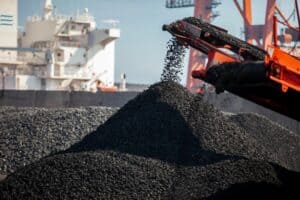Energy analysts emphasize that nuclear is the sole solution for weaning off coal, but the 10-year timeframe and delays raise concerns.

If South Africa has any hopes of weaning itself off coal, nuclear is the only option, according to energy analysts, who also note the plan would take at least 10 years before making a difference on the grid, despite this plan already being two years behind schedule.
Minister said process to procure additional nuclear capacity underway
This after Electricity Minister Kgosientsho Ramokgopa announced yesterday that the process to procure additional nuclear capacity would get underway now that National Energy Regulator of SA (Nersa) has approved it.
In a media briefing, Ramokgopa said the next step would be publishing a Government Gazette. He said this marked the start of the procurement process, describing it as a “significant milestone”.
“We are going out to ensure that we are able to get that additional 2 500MW of nuclear capacity to ensure we can meet the issues of national security and energy sovereignty,” he added.
“What we know about nuclear is it is the cheapest, safest and most reliable option. And we are going this route. Neither side has made a determination but there is a significant amount of technological advancements that have happened in this space.”
ALSO READ: Nersa approves process to secure 2,500MW nuclear power
Procurement has not started
According to energy analyst Lungile Mashele, the procurement has not started, although it was scheduled to start in March last year “and looks to only start in March next year, when the request for proposal is scheduled to be released”.
“The build-up to this moment has been long, litigious and arduous – made that way by government ineptitude and anti-nuclear lobby groups. Nuclear is the only pathway to an energy mix that has no CO2 emissions and provides baseload capacity,” she said.
“The build time is long and is characterised by time and cost overruns. The costs are well within limits and nuclear has the highest capacity factor as a technology and the lowest levelised cost of energy, especially considering it’s 70- year life span.”
Nuclear is cheaper
She agreed nuclear was cheaper.
Mashele said the key to the procurement was transparency, contracting regime (turnkey) and the cost.
ALSO READ: Government seeking ‘legal interpretation’ of load shedding court order – Ramokgopa
“Lastly, people should not draw false equivalencies with the cost of nuclear and renewables in upcoming weeks. Renewables are currently R0.60 per kWh whereas nuclear is estimated to be R1.35 per kWh,” she said.
“However, consider that if renewables were available for 24 hours, they would need batteries. This would take the cost of renewables to R2 per kWh.
“Renewables also don’t provide the following: dispatched ramping, synchronous power, peak capacity, frequency and voltage stability,” Mashele said.
“Nuclear is definitely a longterm energy security plan and not for the short term. Nuclear will take about 10 years before you see anything on the grid.
“Nuclear is also famous for time and cost overruns. To end load shedding one needs to consider short- and long-term solutions.
ALSO READ: Ramokgopa says planned maintenance is why SA still seeing stage 3 and 4 load shedding
“The reason Eskom has decided to delay its decommissioning plans is because they need firm capacity to replace the coal they will be decommissioning – they will get this from nuclear. The integrated resource plan has not been released yet but I’m willing to bet that the first nuclear unit coincides with the decommissioning of coal.”
Announcement was not ‘going to assist in alleviating load shedding’
Earthlife Africa director Makoma Lekalakala said the announcement was not, by any means, “going to assist in alleviating load shedding, because any form of nuclear construction will likely take 20 or more years to complete”.
“It’s surprising how the announcement on the 2 500MW ministerial determination is made by the minister of electricity,” Lekalakala said.
“This is something we expected to be announced by Nersa, to let us know that the department of mineral resources and energy had satisfied the suspensive conditions that were set, according to Section 34.
“Section 34 also mentions that any electricity generation option has got to be the least cost option and we know that nuclear is not the least cost,” Lekalakala said.
Support Local Journalism
Add The Citizen as a Preferred Source on Google and follow us on Google News to see more of our trusted reporting in Google News and Top Stories.






